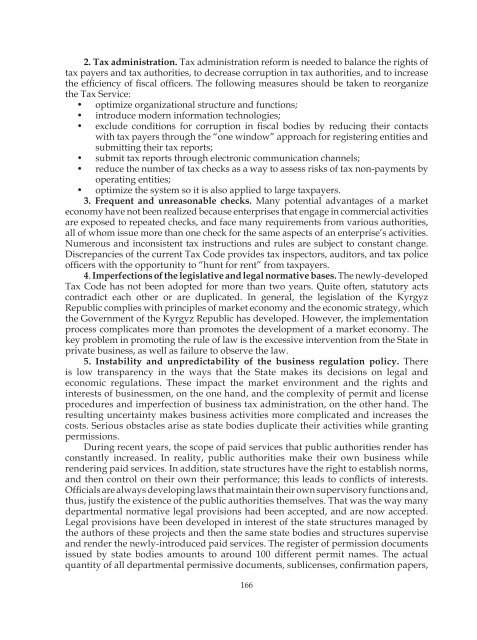KYRGYZSTAN TODAY Policy briefs on - Department of Geography
KYRGYZSTAN TODAY Policy briefs on - Department of Geography
KYRGYZSTAN TODAY Policy briefs on - Department of Geography
You also want an ePaper? Increase the reach of your titles
YUMPU automatically turns print PDFs into web optimized ePapers that Google loves.
2. Tax administrati<strong>on</strong>. Tax administrati<strong>on</strong> reform is needed to balance the rights <strong>of</strong><br />
tax payers and tax authorities, to decrease corrupti<strong>on</strong> in tax authorities, and to increase<br />
the efficiency <strong>of</strong> fiscal <strong>of</strong>ficers. The following measures should be taken to reorganize<br />
the Tax Service:<br />
• optimize organizati<strong>on</strong>al structure and functi<strong>on</strong>s;<br />
• introduce modern informati<strong>on</strong> technologies;<br />
• exclude c<strong>on</strong>diti<strong>on</strong>s for corrupti<strong>on</strong> in fiscal bodies by reducing their c<strong>on</strong>tacts<br />
with tax payers through the “<strong>on</strong>e window” approach for registering entities and<br />
submitting their tax reports;<br />
• submit tax reports through electr<strong>on</strong>ic communicati<strong>on</strong> channels;<br />
• reduce the number <strong>of</strong> tax checks as a way to assess risks <strong>of</strong> tax n<strong>on</strong>-payments by<br />
operating entities;<br />
• optimize the system so it is also applied to large taxpayers.<br />
3. Frequent and unreas<strong>on</strong>able checks. Many potential advantages <strong>of</strong> a market<br />
ec<strong>on</strong>omy have not been realized because enterprises that engage in commercial activities<br />
are exposed to repeated checks, and face many requirements from various authorities,<br />
all <strong>of</strong> whom issue more than <strong>on</strong>e check for the same aspects <strong>of</strong> an enterprise’s activities.<br />
Numerous and inc<strong>on</strong>sistent tax instructi<strong>on</strong>s and rules are subject to c<strong>on</strong>stant change.<br />
Discrepancies <strong>of</strong> the current Tax Code provides tax inspectors, auditors, and tax police<br />
<strong>of</strong>ficers with the opportunity to “hunt for rent” from taxpayers.<br />
4. Imperfecti<strong>on</strong>s <strong>of</strong> the legislative and legal normative bases. The newly-developed<br />
Tax Code has not been adopted for more than two years. Quite <strong>of</strong>ten, statutory acts<br />
c<strong>on</strong>tradict each other or are duplicated. In general, the legislati<strong>on</strong> <strong>of</strong> the Kyrgyz<br />
Republic complies with principles <strong>of</strong> market ec<strong>on</strong>omy and the ec<strong>on</strong>omic strategy, which<br />
the Government <strong>of</strong> the Kyrgyz Republic has developed. However, the implementati<strong>on</strong><br />
process complicates more than promotes the development <strong>of</strong> a market ec<strong>on</strong>omy. The<br />
key problem in promoting the rule <strong>of</strong> law is the excessive interventi<strong>on</strong> from the State in<br />
private business, as well as failure to observe the law.<br />
5. Instability and unpredictability <strong>of</strong> the business regulati<strong>on</strong> policy. There<br />
is low transparency in the ways that the State makes its decisi<strong>on</strong>s <strong>on</strong> legal and<br />
ec<strong>on</strong>omic regulati<strong>on</strong>s. These impact the market envir<strong>on</strong>ment and the rights and<br />
interests <strong>of</strong> businessmen, <strong>on</strong> the <strong>on</strong>e hand, and the complexity <strong>of</strong> permit and license<br />
procedures and imperfecti<strong>on</strong> <strong>of</strong> business tax administrati<strong>on</strong>, <strong>on</strong> the other hand. The<br />
resulting uncertainty makes business activities more complicated and increases the<br />
costs. Serious obstacles arise as state bodies duplicate their activities while granting<br />
permissi<strong>on</strong>s.<br />
During recent years, the scope <strong>of</strong> paid services that public authorities render has<br />
c<strong>on</strong>stantly increased. In reality, public authorities make their own business while<br />
rendering paid services. In additi<strong>on</strong>, state structures have the right to establish norms,<br />
and then c<strong>on</strong>trol <strong>on</strong> their own their performance; this leads to c<strong>on</strong>flicts <strong>of</strong> interests.<br />
Officials are always developing laws that maintain their own supervisory functi<strong>on</strong>s and,<br />
thus, justify the existence <strong>of</strong> the public authorities themselves. That was the way many<br />
departmental normative legal provisi<strong>on</strong>s had been accepted, and are now accepted.<br />
Legal provisi<strong>on</strong>s have been developed in interest <strong>of</strong> the state structures managed by<br />
the authors <strong>of</strong> these projects and then the same state bodies and structures supervise<br />
and render the newly-introduced paid services. The register <strong>of</strong> permissi<strong>on</strong> documents<br />
issued by state bodies amounts to around 100 different permit names. The actual<br />
quantity <strong>of</strong> all departmental permissive documents, sublicenses, c<strong>on</strong>firmati<strong>on</strong> papers,<br />
166
















